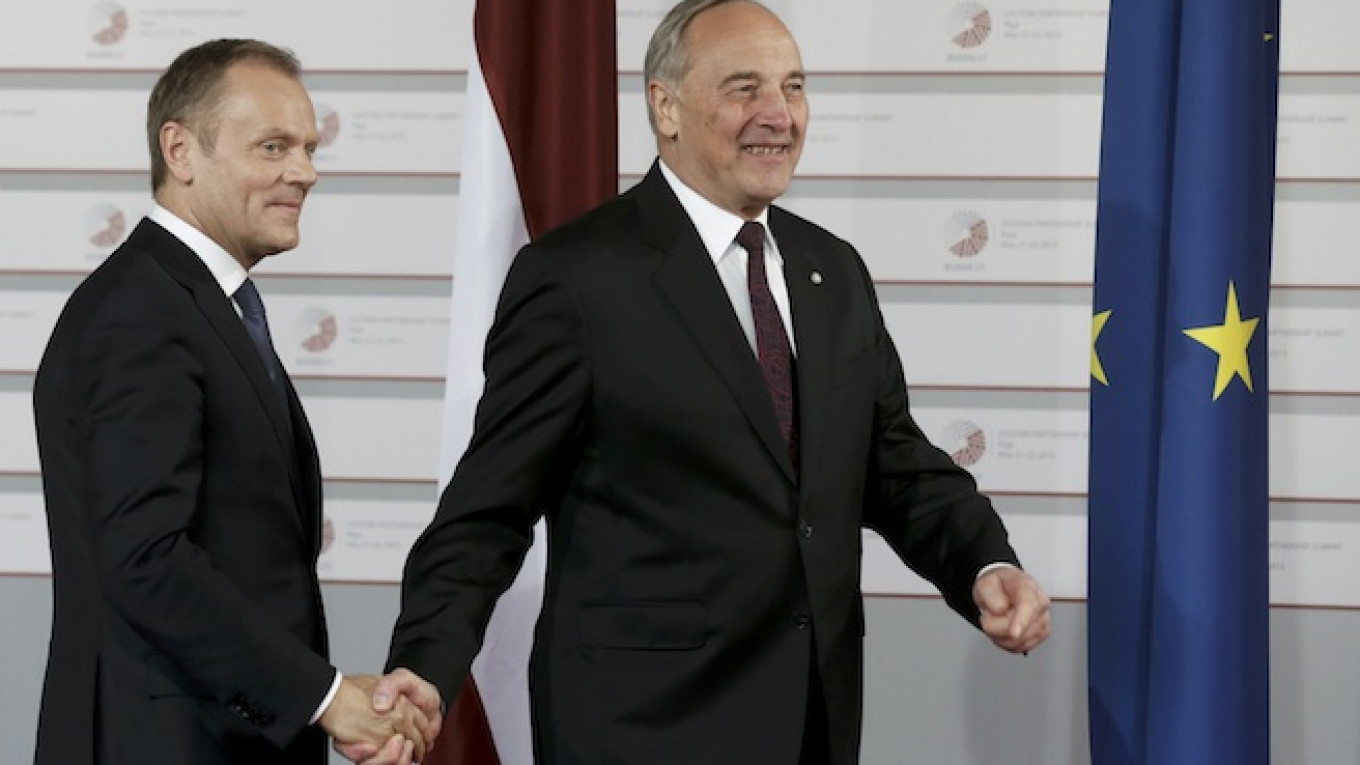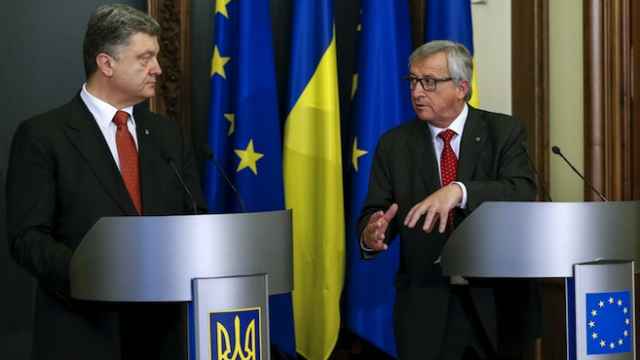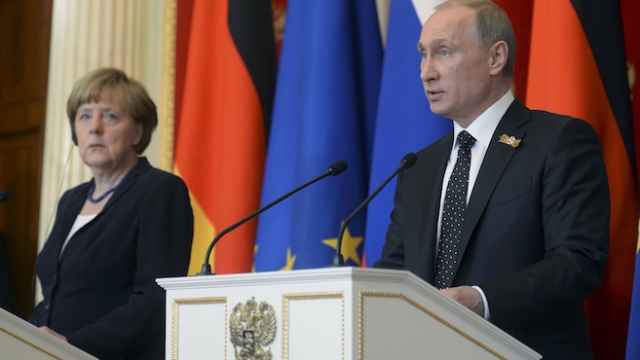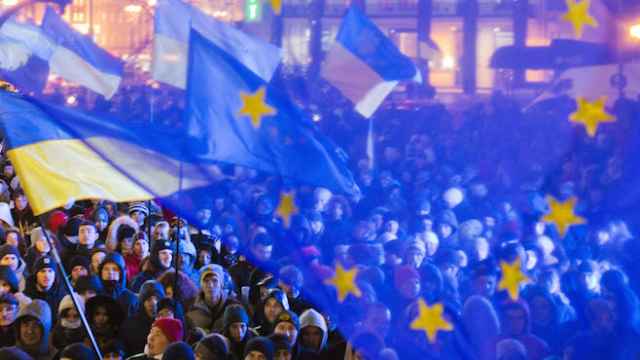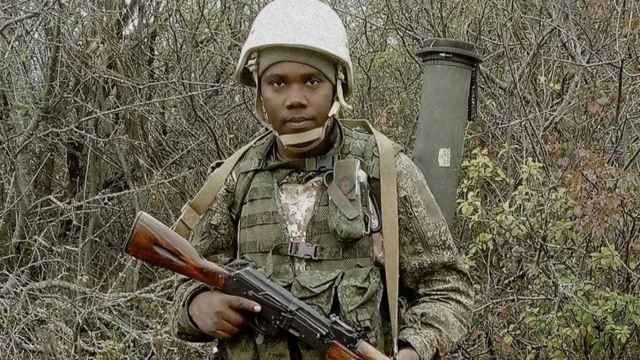RIGA — European Union leaders have met six ex-Soviet neighbors in Riga, rejecting Russian "bullying" in the 18 months since their last summit in a once Kremlin-ruled EU capital sparked conflict in Ukraine.
"The European Union stays the course despite the intimidation, the aggression, even the war, of the last year," said summit chair Donald Tusk on Thursday. He dismissed Moscow's fear the EU was wooing away its former vassals but accused it of "bullying" them to make up for Russia's lack of attractions as an ally.
Yet a wariness among Europe's great powers about provoking President Vladimir Putin has curbed ambition in Brussels and the most pro-Western leaders of the six "Eastern Partnership" countries could not entirely hide their disappointment at a lack of firmer promises of eventual membership of the bloc.
Officials were still drafting a joint communique for Friday that could satisfy all 34 delegations. That underscored what diplomats call "differentiated" EU relations with neighbors who include Ukraine and Georgia, which have seen fighting with Russia, and Armenia and Belarus, more sympathetic to Putin.
Ukrainian President Petro Poroshenko insisted he was not disappointed with a draft joint statement that will reaffirm on Friday only Kiev and others' "European aspirations." But he stressed that the "perspective" of EU accession remained a goal.
Some of the EU's newer members in the east, regret that caution. But German Chancellor Angela Merkel, herself brought up in Communist East Germany, was clear, telling parliament in Berlin before leaving: "We must not create false expectations."
EU chief executive Jean-Claude Juncker said "they are not ready, we are not ready", but added "the process is on its way."
The draft renews an offer of visa-free travel to the EU for Georgians and Ukrainians to match that granted to Moldova last year. But Kiev and Tbilisi must still make more reforms first as a quid pro quo.
Locked in a frozen border conflict since Soviet times, Armenia and Azerbaijan will again be urged to settle. Despite praise for his role in mediating between Russia and Ukraine, Belarussian President Alexander Lukashenko did not breach an EU travel ban to attend. Like the absent Azeri leader, he would have faced some harsh words from the others about human rights.
In an exercise in EU linguistic gymnastics, participants may also sign up to a condemnation of Russia's annexation of Crimea from Ukraine while letting Armenia and Belarus stick to the backing they gave Moscow in a UN vote on the issue last year.
However, Tusk, a former prime minister of Poland, did not mince his words in condemning Moscow: "The Eastern Partnership is not a beauty contest between Russia and the EU," he said.
"But … beauty does count; if Russia were a bit softer, more charming, more attractive, perhaps it wouldn't have to compensate for its shortcomings by destructive, aggressive and bullying tactics against its neighbors."
Painful Past
Pursuing a process it launched six years ago to offer trade and aid in hopes of fostering stable democracies on its flank, the EU was plunged into Europe's deepest crisis since the Cold War when it offered Ukraine free trade at a summit in late 2013.
The 11th-hour refusal by Ukraine's then president to sign the EU pact in Vilnius brought pro-Western protesters onto Kiev's Maidan square. That led to a bloody revolt which Russia denounced as a fascist coup and used to justify taking Crimea and supporting separatists in eastern Ukraine.
EU officials take pains to stress achievements of the policy and the summit draft calls for more economic cooperation and efforts to improve energy, transport and network links.
As well as problems in the east, Merkel faced another to the south when she and French President Francois Hollande met Greek Prime Minister Alexis Tsipras after dinner on Thursday, though officials saw no breakthrough on Athens' talks with creditors.
Friday will also be a first chance for EU leaders to meet British Prime Minister David Cameron since he was re-elected two weeks ago, winning a mandate to reform London's ties with the EU before putting its membership of the bloc to a referendum. His EU partners said they want to hear Cameron's demands.
A Message from The Moscow Times:
Dear readers,
We are facing unprecedented challenges. Russia's Prosecutor General's Office has designated The Moscow Times as an "undesirable" organization, criminalizing our work and putting our staff at risk of prosecution. This follows our earlier unjust labeling as a "foreign agent."
These actions are direct attempts to silence independent journalism in Russia. The authorities claim our work "discredits the decisions of the Russian leadership." We see things differently: we strive to provide accurate, unbiased reporting on Russia.
We, the journalists of The Moscow Times, refuse to be silenced. But to continue our work, we need your help.
Your support, no matter how small, makes a world of difference. If you can, please support us monthly starting from just $2. It's quick to set up, and every contribution makes a significant impact.
By supporting The Moscow Times, you're defending open, independent journalism in the face of repression. Thank you for standing with us.
Remind me later.


